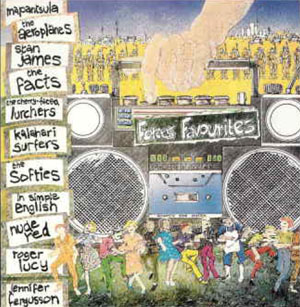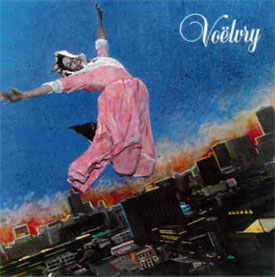SHIFTY RECORDS

South African musical underground legends
by Richard Haslop
(August 2010)
Curious as it may seem, the fact that the first release by Shifty Records, a South African record company whose significance far outweighs its fame, was by not by a South African artist at all, or even recorded in South Africa, somehow typifying the Shifty method. It was the self-titled debut by Lesotho band Sankomota, and was recorded by the label in the group's homeland, where Shifty's Lloyd Ross temporarily parked the caravan that housed its mobile studio. Lesotho is completely surrounded by South Africa, and Sankomota was not allowed across the border on account of the political nature of its output, which featured several languages, including English, and embraced several musical styles, including rock. Ross, previously a member of highly regarded local rock band the Radio Rats, had formed Shifty to give independent, politically orientated South Africans a voice in an era when independent, politically orientated South African voices were stilled by the censorship not only of the government and its heavily controlled airwaves – radio employees would physically gouge certain LP tracks so they couldn't be played – but also of the mainstream record companies. There was, they say, even a cutting engineer at the country's only record pressing plant who would refuse to cut records which he didn't approveof, and get away with it.
Ross claims not to have been particularly politically inclined. In fact, his original idea was to provide unsigned rock bands in the style of punk and new wave with a relatively cheap recording facility. The orthodox industry usually wouldn't sign anybody even vaguely controversial, and frowned upon any even vaguely controversial material that sometimes snuck out from a few brave souls. But it was virtually impossible to avoid having a political opinion in 1980s South Africa and Ross's recognition of the need to expose the music and musicians that Shifty did certainly had political consequences.
He named the fledgling label after the mobility that the caravan studio provided, rather than the crafty, sly or furtive nature of the business, although those were certainly useful characteristics for anybody hoping to operate in opposition to the oppressive South African regime. The year, appropriately enough, was 1984 and meaningful political discourse seemed far away, with the most significant political opposition in jail or exile. Towards the end of that year, troops comprising mainly young white men serving an initial period of two years of compulsory military conscription were sent into the local townships to quell any hint of unrest by their black countrymen.
But a groundswell of resistance was beginning to take hold. The trade union movement was starting to flex its muscles, the United Democratic Front had been formed the previous year, and the End Conscription Campaign, dedicated to achieve what its name suggested, would be launched in October. In many ways, Shifty Records represented the musical face of this surge of defiance.
Ross's original partner in the Shifty enterprise was Ivan Kadey, the guitarist in National Wake, highly unusual if not unique in South Africa in that it was a punk-infused mixed-race rock band, but Kadey soon emigrated to the USA. Warrick Sony, a soundscape artist and experimental composer who continues to release albums under the name of the Kalahari Surfers, bought his way into the business by providing it with a 16-track tape recorder, and the Surfers' strongly political Own Affairs was its second release. Sony's method included cutting, pasting and juxtaposing the recorded voices of local political and other authority figures over a musical sensibility informed by Robert Wyatt, Krautrock and others not generally heard in a South African context. Several of the Surfers' recordings, whose provocative titles included Sleep Armed and Living In The Heart Of The Beast, had to be pressed in the UK by Recommended Records, run by Henry Cow's Chris Cutler, and then clandestinely imported back into South Africa.

James Phillips, whose music was an interesting combination of punk attitude, Dylanesque and Randy Newman like songwriting and the slightly eccentric roots rock of Little Feat, was arguably the leading figure on the punk and new wave inclined scene that gave birth to the Shifty idea in the first place. He remains, a decade and a half after his death as the result of a car crash, a cult figure among South Africans of his musical generation. His bands included in your face East Randers Corporal Punishment, the short lived Illegal Gathering and the much loved Cherry Faced Lurchers, all of which feature in the Shifty catalogue. However, his most important effect on local music may have been under the name of his Afrikaans alter ego Bernoldus Niemand, whose 1985 release proved vastly influential on an increasingly large body of disaffected Afrikaner youth. Their own disenchantment then expressed itself on Shifty through songwriters like Koos Kombuis and Johannes Kerkorrel – and his Gereformeerde Blues Band (the word means 'reformed,' but refers to the overarching and overbearing influence on traditional Afrikaans culture of the Dutch Reformed Church) - and then turned itself into a South African rock subgenre of its own. Phillips/Niemand's song "Hou My Vas Korporaal" ("Hold Me Tight, Corporal") became an anthem of the End Conscription Campaign and among local draft dodgers and even those who, in order to avoid arrest or exile, reluctantly answered the Defence Force's call to protect South Africa's borders (and townships) from an alleged Communist-led invasion.
Needless to say, none of these records gained any airplay on the formal stations, they received almost no mainstream press, and even finding them in conventional record stores was little short of a shopping miracle. Yet the company kept going thanks to word of mouth inside South Africa and sponsorship received from outside and, during the second half of the decade, it had what was, by its standards, a hit record.
Mzwakhe Mbuli was a poet whose vehemently anti-government recitals, delivered in a deep and ringing baritone, were often heard at resistance rallies. He was recorded by the label over musical backing, and Change Is Pain (released 1986), which sounded a bit like an African version of a highly politicized Prince Far I, was released. It was immediately banned, but underground copies sold and otherwise changed hands in surprisingly large numbers and the album remains iconic even today. Mbuli released further albums and performed at the inauguration of Nelson Mandela as State President, but the advent of democracy did not prevent him from speaking out as vociferously against what he still believed to be wrong. Jailed for armed robbery in 1999, he spent four and a half years in prison. He has always claimed his innocence, and his supporters believe that he was set up.
Another African artist initially on Shifty who has gone on to international acclaim is Vusi Mahlasela, often known simply as "The Voice." Though his subsequent output has drifted inexorably towards the middle of the road, the quiet political strength of his early '90's When You Come Back debut remains impressive.
Shifty continued to release albums relatively regularly until the mid '90's and its catalogue is now around 70 strong, if you include a handful of albums that it licensed by artists from elsewhere in Africa, that introduced local audiences to the wonders of Salif Keita and a few others. Shifty features recordings of political speeches, trade union choirs, intrinsically South African acoustic guitar instrumentalists, English and Afrikaans language rock from the fringes and the barricades, township jive irrepressible and updated for the '80's and '90's, a rocked up version of the high spirited goema music of the Western Cape's Coloured communities and more.
The Shifty release schedule slowed considerably after the birth of South African democracy in 1994, with internationally recognized author Rian Malan's 2005 Alien Inboorling ("alien native"), a typically sardonically honest reflection on contemporary Afrikaner issues, its first album for several years and its latest except for the excellent Shot Down, a compilation of "resistance music from apartheid South Africa" drawn from the Shifty archive.
Indeed, the best way into the Shifty legacy is probably through this, or one of three older compilation albums that may constitute the label's most important contribution to the South African musical landscape. A Naartjie In Our Sosatie (literally "a tangerine in our kebab", but a play, partly in a South African accent, on "anarchy in our society") was the earliest, followed by Forces Favourites, an ironic reference to state radio's armed forces request programme that played music which could not have been further removed from Shifty in spirit or intent, and then Voëlvry, which documented the incipient Afrikaans music revolution. These collections were, for much of the label's audience, its introduction to a range of artists of relative degrees of obscurity, including one, Timothy, and who recorded one song and was never heard of again, who represented an essential slice of South African cultural territory that might otherwise have been completely ignored.
